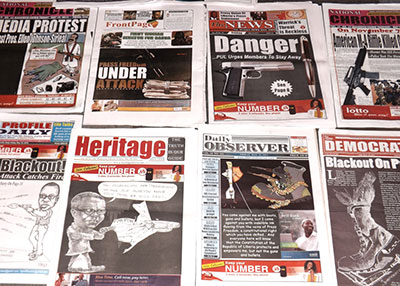Most governments, even repressive ones, at least give lip service to supporting freedom of the press–especially on World Press Freedom Day, May 3. But in Liberia this month, Othello Daniel Warrick, President Ellen Johnson Sirleaf’s chief security aide, shocked local journalists by threatening them and calling them “terrorists” at a public event to mark the occasion, according to news reports and local media groups.
Warrick’s threats set off a firestorm of protest which has yet to subside. Although he has since backpedaled and some government officials have spoken up to reaffirm their commitment to press freedom, the media are imposing a blackout on coverage of the presidency, which they insist they will uphold until Sirleaf herself speaks out.
Warrick–the head of Liberia’s presidential guard, the Executive Protection Service (EPS), which oversees Sirleaf’s personal security–was a scheduled guest speaker at a May 3 event titled “Media-Security Relations: An Imperative for Consolidating Peace in Liberia” in west-central Grand Bassa County. But instead of emphasizing peace when he took the podium, he threatened the gathering of over 100 media practitioners assembled, saying the EPS has the right to arrest them without warrant and he would “go after” any journalist who publishes articles critical of him or the presidency, news reports said.
“Any press member that surpasses his/her responsibility to get involved in presidential intelligence; trust me, we will restrict you,” Warrick said. “Be careful, because you have your pen and we have our guns. And if you incriminate the character or integrity of Liberians, like myself, we will come after you… the EPS has the right to arrest you without warrant.”
A shocked and angry audience reacted with murmurs and boos. In response, Warrick yelled, “Some of you, not all of you, are terrorists,” according to news reports.
Following the event, Warrick, a Liberian-American military veteran who has courted controversy in the past, told the Global News Network Liberia that he had no regrets about his anti-press statements. “I am here to protect the presidency. EPS will not hesitate to go after any journalist who will intrude the intelligence of the presidency,” he was quoted as saying.
Warrick clearly wasn’t expecting the ensuing backlash from the press, civil society, political groups, and individuals, who rallied to demand that Sirleaf sanction Warrick and that he retract his statement, according to news reports.
For days, the government dragged its feet, with presidential spokesman Jerolinmek Piah citing ongoing investigations into the incident, FrontPage Africa reported. On May 8, Isaac Jackson, deputy information minister, wrote to Peter Quaqua, president of the Press Union of Liberia (PUL), an ensemble of some 400 journalists with over 40 newspapers, over 20 radio stations, and six television stations, to reaffirm the government’s commitment to press freedom, asking Quaqua to disregard Warrick’s comments as “lacking in authority to pronounce the established position of the government.”
Jackson’s letter did not pacify the PUL, which called a mass meeting of its members on May 9 and decided to boycott coverage of the Liberian presidency to protest Sirleaf’s “glaring silence” and perceived endorsement of Warrick’s threats, according to news reports. In addition, independent newspapers printed black front pages; radio and TV stations suspended broadcast for two hours a day; and the PUL said it would consult with The Africa Editors Forum about revoking the forum’s 2010 Friend of the Media Africa Award bestowed on Sirleaf, the reports said.
That shook the government. Warrick backpedaled, saying his comments were meant to encourage journalists to sensitively handle intelligence information about the presidency and not meant to endanger any journalist’s life, according to news reports. When reached by telephone, Warrick declined to comment, referring me to the Ministry of Information.
Jackson issued a press release May 11 asking the PUL to reverse its decision, which he likened to “unjustifiably” penalizing innocent Liberians, according to news reports. “It defies the imagination that a free press would bind itself to self-censorship, and by its own consideration and action, deliberately deny the Liberian people of their fundamental right to information about their government,” Jackson said.
When I contacted Jackson, he maintained that this is the government’s position, and said the PUL’s action violates Article 15 (c) of the Liberian Constitution which states “…there shall be no limitation on the public right to be informed about the government and its functionaries.”
In an email exchange with me, Information Minister Lewis Brown said PUL’s demand that Sirleaf personally address Warrick’s comments was “unfair.” He said the union’s decision to maintain a news blackout was “unjustifiable” and an “overreaction” in the face of “consolidated repudiation by the agencies of the government vested with the authority to speak on behalf of the government and the president.”
PUL President Peter Quaqua told me the Information Ministry’s statements would have no effect on PUL’s decision. “The [PUL protest] actions will stay in force until the president can redeem herself” by breaking her silence, Quaqua told me. “She continues to remain silent on this grave issue that has questioned her promise for democracy through press freedom. Silence means consent,” Quaqua said.
Sirleaf, who is currently on an official visit to the United States, has been criticized for her silence on press freedom issues in the past–notably when Liberian journalist Mae Azango, a 2012 CPJ International Press Freedom Awardee, went into hiding for weeks following death threats for her reporting on the prevalence of female genital mutilation in the country.
